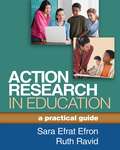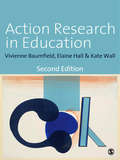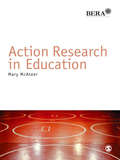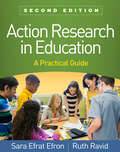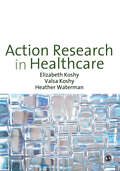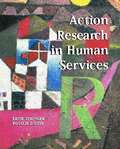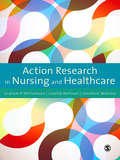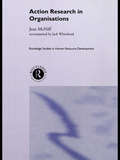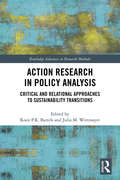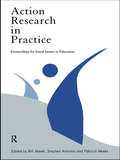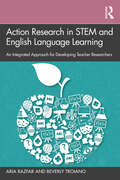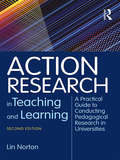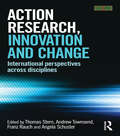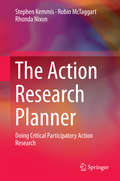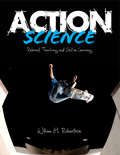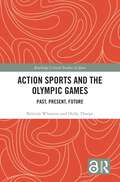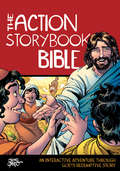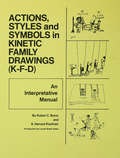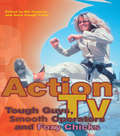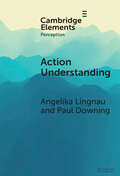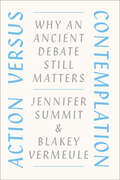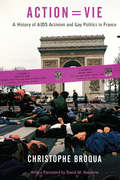- Table View
- List View
Action Research In Education: A Practical Guide
by Sara Efrat Efron Ruth RavidThis text shows educators step by step how to conduct classroom- and school-based studies to improve instructional practices. The book presents methods and strategies for implementing each stage of the action research cycle, providing balanced coverage of qualitative, quantitative, and mixed methods approaches.
Action Research in Education: Learning Through Practitioner Enquiry
by Elaine Hall Kate Wall Vivienne Marie BaumfieldAction Research in Education is an essential guide for any lecturer, teacher or student-teacher interested in doing research. This exciting new edition of a popular text is an important resource for any education professional interested in investigating learning and teaching. Building on the success of Action Research in the Classroom, the authors have revised, updated and extended this book to include examples from further and higher education. It maps out easy-to-follow steps for usefully applying an action research approach and is full of practical tips and examples of real practitioner research projects from a range of schools, colleges and universities. This book will help teachers to: - understand and apply practitioner inquiry - enhance their problem-solving skills - locate their own activity in a wider context - maximise opportunities to develop practice - evaluate the needs of their learners Clear, pragmatic and timely, this is a must-have text for all teachers and students of education. Vivienne Baumfield is Professor of Pedagogy, Policy and Innovation in the School of Education, University of Glasgow Elaine Hall is Lecturer in Research Methods, School of Education, Communication and Language Sciences, Newcastle University Kate Wall is Senior Lecturer in the School of Education, Durham University
Action Research in Education (BERA/SAGE Research Methods in Education)
by Mary Mcateer'This structured and accessible book, with excellent case studies, will give confidence to anyone embarking on an action research project'-Professor Ken Jones, Dean of Humanities, Swansea Metropolitan University 'Masterly in its lucidity, this text contextualises Action Research in the fiedl of Education Practice; and is therefore a valuable resource in both professional learning and improved professional practice'-Effie Maclellan, Research Professor in Education, University of Strathclyde, Glasgow 'An engaging, clearly written, and helpfully structured articulation of how AR can be implemented and practised in order to make a difference within educational contexts'-Dr Stephen Parker, University of Worcester 'Will assist practitioner researchers to develop a profound and critical understanding of this approach'-Professor Marion Jones, Liverpool John Moores University This hands-on and user-friendly book uses illustrative case studies to demonstrate and explore the potential for change in real social situations. This book seeks to assert the academic integrity of action research and to de-mystify the process. Each chapter includes: - a 'how to' section based on concrete examples and dilemmas - commentary that relates examples to the broader field - a discussion of the underlying theoretical approach - discussion and exploration of quality issues - discussion of ethical and pragmatic decision-making The mix of theoretical grounding and focus on real issues will be of benefit to Master's level or advanced undergraduate students on Education and Research Methods courses or those undertaking Action Research as part of professional development activities. Mary McAteer is Director of the Mathematics Specialist Teacher (MaST) programme at Edge Hill University Research Methods in Education series: Each book in this series maps the territory of a key research approach or topic in order to help readers progress from beginner to advanced researcher. Each book aims to provide a definitive, market-leading overview and to present a blend of theory and practice with a critical edge. All titles in the series are written for Master's-level students anywhere and are intended to be useful to the many diverse constituencies interested in research on education and related areas. Other books in the series: - Using Case Study in Education Research -Qualitative Research in Education, Atkins and Wallace - Ethnography in Education, Mills and Morton For more about the series and additional resources visit the BERA/SAGE series page here.
Action Research in Education, Second Edition: A Practical Guide
by Sara Efrat Efron Ruth RavidAcclaimed as a text and professional development tool, this user-friendly resource has now been revised and updated, and offers expanded coverage of collaborative action research (CAR) and participatory action research (PAR). Preservice and inservice educators get crucial step-by-step guidance for conducting classroom- and school-based studies to improve their instructional practices. Organized to mirror the full cycle of action research, the book provides balanced coverage of qualitative, quantitative, and mixed methods approaches. Vivid vignettes and examples illustrate research approaches for a range of teaching and learning situations, school subjects, and age groups (PreK–12). Readers learn how research approaches are driven by the research question, as well as how to develop data collection strategies; design and/or evaluate assessment tools; interpret, analyze, report, and implement study results; and design a new cycle of research that builds on the previous one. New to This Edition *In-depth descriptions of CAR and PAR--which enable groups of teachers to work together to solve problems in a classroom or school--plus examples of both throughout the book. *Expanded or new discussions (with examples) of such topics as how research approaches and methods are driven by the research question, how to assess different types of reliability and validity, the differences between analysis and interpretation, and how to use sequential cycles of research for continuous improvement and professional development. *Fully updated references and resources. Pedagogical Features *Both individual and group exercises and activities in every chapter. *New and updated checklists and guidelines that enable busy educators to self-assess the progress and quality of their studies. *Sample templates to assist in development of research instruments. *Example boxes illustrating the components of an action research report. *Summary tables highlighting key aspects of different research strategies. *Chapter summaries (now shorter for ease of use) and suggestions for further reading.
Action Research in Healthcare
by Heather Waterman Dr Elizabeth Koshy Dr Valsa KoshyAction Research in Healthcare is a practical guide to using research for improving practice in healthcare contexts. As an increasingly popular method of inquiry, action research is widely used in healthcare to investigate professional practice and patients' experience while simultaneously: - introducing innovations - planning, actioning and evaluating new ideas - seeking to improve patient care - working collaboratively. Taking you through the process step-by-step, Action Research in Healthcare explains how to tackle each stage of your project - from planning the study and undertaking a literature review, through to gathering and interpreting data and implementing findings. Examples of action research projects are included throughout to illustrate how the method works in practice. Action Research in Healthcare assumes no previous knowledge of the subject and is the ideal resource for anyone about to start or already involved in a project.
Action Research in Human Services
by Ernie Stringer Rosalie DwyerAction Research in Human Services presents an approach to action research that assists human service professionals to improving their practice. Though the action research processes articulated in this book may be used effectively with individuals, they are particularly relevant to work with groups, families, and communities. Action research is suited to a wide range of human services work--child protection, family support, domestic violence, juvenile justice, corrections, youth work, aged care, rehabilitation, community work, community development, services to the disabled, and others. Ultimately, action research enables human service professionals to work in partnership with clients, community groups, colleagues, and others to explore significant issues and to take therapeutic action to resolve problems.
Action Research in Nursing and Healthcare
by Dr Loretta Bellman Jonathan Webster Graham WilliamsonAction Research is becoming more popular in nursing and healthcare. It is used by practitioners who want to better understand and improve the quality of their work, and by students who need to do a research project for their course. An Action Research approach enables evidence-based care and links research directly to practice, making it the ideal method for a researcher in these fields. This book introduces readers to Action Research by presenting its key concepts and backing these up with practical examples throughout, often drawn from the authors' own extensive experience. Topics include: - Action research to advance patient care - Collaborative working - Ethics - Participatory Action Research - Writing up and disseminating projects Williamson, Bellman, and Webster - leading figures in the field - provide practical advice for using Action Research in healthcare settings, with patients and alongside other practitioners. Their book presents a flexible approach that can be adapted to researchers' real needs.
Action Research in Organisations (Routledge Studies in Human Resource Development)
by Jean McNiff Jack WhiteheadThe current orthodoxy is that 'knowledge' is the most powerful resource for organisational success. So how can managers develop the appropriate knowledge base to make their organisations grow? The answer lies in action research. Action research is increasingly perceived and used as a powerful methodology to promote professional awareness and development. However, there are very few texts that demonstrate how this can be utilised to promote management and organisational improvement or that emphasise the reflective nature of improving professionalism. Action Research in Organisations fills this gap. Aimed at both practising managers and university students alike, key features of this title include:* the location of management and organisational theory within a framework * examination of the principles and practice of action research* real-world examples and case studies of people attempting to improve their own situations through action research.
Action Research in Policy Analysis: Critical and Relational Approaches to Sustainability Transitions (Routledge Advances in Research Methods)
by Koen P.R. Bartels Julia M. WittmayerToday’s pressing political, social, economic, and environmental crises urgently ask for effective policy responses and fundamental transitions towards sustainability supported by a sound knowledge base and developed in collaboration between all stakeholders. This book explores how action research forms a valuable methodology for producing such collaborative knowledge and action. It outlines the recent uptake of action research in policy analysis and transition research and develops a distinct and novel approach that is both critical and relational. By sharing action research experiences in a variety of settings, the book seeks to explicate ambitions, challenges, and practices involved with fostering policy changes and sustainability transitions. As such it provides crucial guidance and encouragement for future action research in policy analysis and transition research. This text will be of key interest to scholars and students of policy analysis and transition research and more broadly to public administration and policy, urban and regional studies, political science, research and innovation, sustainability science, and science and technology studies. It will also speak to practitioners, policymakers and philanthropic funders aiming to engage in or fund action research.
Action Research in Practice: Partnership for Social Justice in Education
by Stephen Kemmis Bill Atweh Patricia WeekThis book presents a collection of stories from action research projects in schools and a university. This collection is more than simply an illustration of the scope of action research in education - it shows how projects that differ on a variety of dimensions can raise similar themes, problems and issues. The book begins with theme chapters discussing action research, social justice and partnerships in research. The case study chapters cover topics such as: * school environment - how to make a school a healthier place to be * parents - how to involve them more in decision-making * students as action researchers * a state system - a collaborative effort between university staff and a state education department * gender - how to promote gender equity in schools * improving assessment in the social sciences * staff development planning * doing a PhD through action research * writing up action research projects.
Action Research in STEM and English Language Learning: An Integrated Approach for Developing Teacher Researchers
by Aria Razfar Beverly TroianoResponding to the linguistic and cultural diversity of the U.S. K–12 student population and an increasing emphasis on STEM, this book offers a model for professional development that engages teachers in transformative action research projects and explicitly links literacy to mathematics and science curriculum through sociocultural principles. Providing detailed and meaningful demonstrations of participatory action research in the classroom, Razfar and Troiano present an effective, systemic approach that helps preservice teachers support students’ funds of knowledge. By featuring teacher and researcher narratives, this book centers teacher expertise and offers a more holistic and humanistic understanding of authentic and empathetic teaching. Focusing on integrating instructional knowledge from ESL, bilingual, and STEM education, the range of cases and examples will allow readers to implement action research projects in their own classrooms. Chapters include discussion questions and additional resources for students, researchers, and educators.
Action Research in Teaching and Learning: A Practical Guide to Conducting Pedagogical Research in Universities
by Lin NortonPractical and down-to-earth, the second edition of Action Research in Teaching and Learning is an ideal introduction to the subject, offering a distinctive blend of the theoretical and the practical, grounded firmly in the global higher education landscape. Written in an accessible style to build confidence, it provides easily adaptable, practical frameworks, guidelines and advice on research practice within a higher education context. The reader is guided through each stage of the action research process, from engaging with the critical theory, to the practical applications with the ultimate goal of providing a research study which is publishable. Supplemented by useful pedagogical research tools and exemplars of both qualitative and quantitative action research studies, this new edition features chapters engaging with teaching excellence and analysing qualitative and quantitative research, additions to the resources section and a new preface focusing more explicitly on the ever-growing number of part-time academics. Action Research in Teaching and Learning combines a theoretical understanding of the scholarly literature with practical applications and is an essential, critical read for any individual teaching or undertaking action research.
Action Research, Innovation and Change: International perspectives across disciplines
by Thomas Stern Andrew Townsend Franz Rauch Angela SchusterAction research continues to see a growth in interest both internationally and across disciplines. This book demonstrates the diversity in settings and focus for action research and provides a guide to its core aspiration: to achieve principled change. Written by authors from a range of countries and range of disciplines (including education, health care, palliative care, social work and community development), this book answers these key questions: How can action research be used to achieve principled change? How has action research been applied in various disciplines and in different countries? What can be learnt about the conduct of action research from these diverse settings? By means of detailed case studies of successful projects and discussions that challenge and raise theoretical questions, this book explores some of the contemporary cutting edge applications and conceptualisations of action research. Action research paves the way for the empowerment of people involved in social action, and the examples of successful change processes that are the core of this book will prove inspirational and provide practical advice. Written by a range of leading international researchers in the field, this book will define the future for action research for years to come.
Action Research Methods
by Sheri R. KleinIn Action Research Methods , the authors acknowledge that the methodology component is where most of the struggle and confusion lies with students in research methods courses. The overall aim is to assist master's level education students with practical and theoretically grounded approaches to the action research process.
The Action Research Planner
by Stephen Kemmis Robin Mctaggart Rhonda NixonA fully-updated and reworked version of the classic book by Stephen Kemmis and Robin McTaggart, now joined by Rhonda Nixon, The Action Research Planner is a detailed guide to developing and conducting a critical participatory action research project. The authors outline new views on 'participation' (based on Jürgen Habermas's notion of a 'public sphere'), 'practice' (as shaped by practice architectures), and 'research' (as research within practice traditions). They provide five extended examples of critical participatory action research studies. The book includes a range of resources for people planning a critical participatory research initiative, providing guidance on how to establish an action research group and identify a shared concern, research ethics, principles of procedure for action researchers, protocols for collaborative work, keeping a journal, gathering evidence, reporting, and choosing academic partners. Unlike earlier editions, The Action Research Planner focuses specifically on critical participatory action research, which occupies a particular (critical) niche in the action research 'family'. The Action Research Planner is an essential guide to planning and undertaking this type of research.
Action Science: Relevant Teaching and Active Learning
by William H. RobertsonPut student engagement on the fast-track Think action sports like skateboarding and BMX have nothing to do with physical science? Think again, especially as they relate to fundamental physics concepts like motion, force, and simple machines—not to mention the problem solving required. What’s more, because kids will want to, observing action sports is a perfect vehicle for promoting self-directed and collaborative learning . . . with Action Science as your driver’s manual. Through a combination of book and video, Bill Robertson provides all the materials you’ll need to get started, with the NGSS very much in full view. Inside and outside, you’ll find: Detailed instructional methods on momentum, center of gravity, inertia, and centrifugal and centripetal forces Hands-on classroom activities and experiments, including some utilizing common household materials Captivating video via QR codes of top professional and amateur extreme sports athletes demonstrating authentic, high-flying maneuvers Robertson, an associate professor in science and technology education at the University of Texas at El Paso--and an avid skateboarder—has extensively piloted the Action Science program. It works! "This is an outstanding resource for any middle school science teacher trying to engage unmotivated students or implement problem-based learning strategies in a way that is exciting and meaningful!" --Melissa Miller, Middle School Science Teacher Lynch Middle School Farmington, AR
Action Science: Relevant Teaching and Active Learning
by William H. RobertsonPut student engagement on the fast-track Think action sports like skateboarding and BMX have nothing to do with physical science? Think again, especially as they relate to fundamental physics concepts like motion, force, and simple machines—not to mention the problem solving required. What’s more, because kids will want to, observing action sports is a perfect vehicle for promoting self-directed and collaborative learning . . . with Action Science as your driver’s manual. Through a combination of book and video, Bill Robertson provides all the materials you’ll need to get started, with the NGSS very much in full view. Inside and outside, you’ll find: Detailed instructional methods on momentum, center of gravity, inertia, and centrifugal and centripetal forces Hands-on classroom activities and experiments, including some utilizing common household materials Captivating video via QR codes of top professional and amateur extreme sports athletes demonstrating authentic, high-flying maneuvers Robertson, an associate professor in science and technology education at the University of Texas at El Paso--and an avid skateboarder—has extensively piloted the Action Science program. It works! "This is an outstanding resource for any middle school science teacher trying to engage unmotivated students or implement problem-based learning strategies in a way that is exciting and meaningful!" --Melissa Miller, Middle School Science Teacher Lynch Middle School Farmington, AR
Action Sports and the Olympic Games: Past, Present, Future (Routledge Critical Studies in Sport)
by Belinda Wheaton Holly ThorpeBased on a decade of research by two leading action sports scholars, this book maps the relationship between action sports and the Olympic Movement, from the inclusion of the first action sports to those featuring for the first time in the Tokyo Olympic Games and beyond. In an effort to remain relevant to younger audiences, four new action sports, surfing, skateboarding, sport climbing, and BMX freestyle were included in the Tokyo Olympic program. Drawing upon interviews with Olympic insiders, as well as leaders, athletes, and participants in these action sports communities, the book details the impacts on the action sports industry and cultures, and offers national comparisons to show the uneven effects resulting from Olympic inclusion. It reveals the intricate workings of power and politics in contemporary sports organisations, and maps key trends in this changing sporting landscape. Action Sports and the Olympic Games is a fascinating read for anybody studying the Olympics, the sociology of sport, action sports, or sport policy.
Action Sports and the Olympic Games: Past, Present, Future (Routledge Critical Studies in Sport)
by Belinda Wheaton Holly ThorpeBased on a decade of research by two leading action sports scholars, this book maps the relationship between action sports and the Olympic Movement, from the inclusion of the first action sports to those featuring for the first time in the Tokyo Olympic Games and beyond.In an effort to remain relevant to younger audiences, four new action sports, surfing, skateboarding, sport climbing, and BMX freestyle were included in the Tokyo Olympic program. Drawing upon interviews with Olympic insiders, as well as leaders, athletes, and participants in these action sports communities, the book details the impacts on the action sports industry and cultures, and offers national comparisons to show the uneven effects resulting from Olympic inclusion. It reveals the intricate workings of power and politics in contemporary sports organisations, and maps key trends in this changing sporting landscape.Action Sports and the Olympic Games is a fascinating read for anybody studying the Olympics, the sociology of sport, action sports, or sport policy.
The Action Storybook Bible: An Interactive Adventure through God's Redemptive Story
by Catherine Devries Sergio CarielloThe Action Storybook Bible invites families with children ages 8 and under explore God’s redemptive story together. From the sleek and amazing creatures God created at the beginning of the world to the powerful kings who reigned over ancient Israel to Jesus’s gift of eternal life for you and your family—God has a beautiful and exciting plan for the world. Where do you fit into that plan? How are the truths found in God’s Word reflected in your life? This Bible storybook features 15 episodes highlighting key milestones in God’s story, packed with dozens of scenes—combining stories from God’s Word with brand-new captivating illustrations from Brazilian master-artist Sergio Cariello, illustrator of the bestselling The Action Bible. Discover your family’s place in God’s redemptive story and together put your faith into action!Interactive features include:Fifteen episodes loaded with over 350 brand-new illustrations from master-artist Sergio Cariello.Short and easy reading for all ages. Take turns telling God’s redemptive story!The Life, Faith, Action! feature wraps up each episode and helps your family recognize how God is moving through each story, discover how that relates to your daily lives, and feel inspired to put your faith into action.Heroes Hall of Fame index, where you can look up your favorite Bible characters and discover their stories!
Action, Styles, And Symbols In Kinetic Family Drawings Kfd
by Robert C. Burns S. Harvard KaufmanFirst published in 1972. Routledge is an imprint of Taylor & Francis, an informa company.
Action TV: Tough-Guys, Smooth Operators and Foxy Chicks
by Anna Gough-Yates Bill OsgerbyFrom re-runs of 'TV classics' like The Avengers or Starsky and Hutch, to soundtracks, club nights and film remakes such as Mission Impossible II, the action series is enjoying a popular revival. Yet little attention has been paid to the history, nature and enduring appeal of the action series, and its place in popular culture, past and present.Action TV traces the development of the action series from its genesis in the 1950s. From The Saint to Knigh t Rider, contributors explore the key shows which defined the genre, addressing issues of audiences and consumption, gender and sexuality, fashion and popular culture. They examine the institutional and cultural factors influencing the action series, and relate shifts in the genre to other forms of popular culture including film, pop music, fashion and popular literature.Chapters include:* Of leather suits and kinky boots: The Avengers, style and popular culture* 'Who loves ya, baby?': Kojak, action and the great society*'A lone crusader in a dangerous world': heroics of science and technology in Knight Rider* Angels in chains? feminism, femininity and consumer culture in Charlie's Angels* 'Who's the cat that won't cop out?' Black masculinity in American action shows of the sixties and seventies
Action Understanding (Elements in Perception)
by Angelika Lingnau Paul DowningThe human ability to effortlessly understand the actions of other people has been the focus of research in cognitive neuroscience for decades. What have we learned about this ability, and what open questions remain? In this Element the authors address these questions by considering the kinds of information an observer may gain when viewing an action. A 'what, how, and why' framing organises evidence and theories about the representations that support classifying an action; how the way an action is performed supports observational learning and inferences about other people; and how an actor's intentions are inferred from her actions. Further evidence shows how brain systems support action understanding, from research inspired by 'mirror neurons' and related concepts. Understanding actions from vision is a multi-faceted process that serves many behavioural goals, and is served by diverse mechanisms and brain systems.
Action versus Contemplation: Why an Ancient Debate Still Matters
by Jennifer Summit Blakey Vermeule“All of humanity’s problems stem from man’s inability to sit quietly in a room alone,” Blaise Pascal wrote in 1654. But then there’s Walt Whitman, in 1856: “Whoever you are, come forth! Or man or woman come forth! / You must not stay sleeping and dallying there in the house.” It is truly an ancient debate: Is it better to be active or contemplative? To do or to think? To make an impact, or to understand the world more deeply? Aristotle argued for contemplation as the highest state of human flourishing. But it was through action that his student Alexander the Great conquered the known world. Which should we aim at? Centuries later, this argument underlies a surprising number of the questions we face in contemporary life. Should students study the humanities, or train for a job? Should adults work for money or for meaning? And in tumultuous times, should any of us sit on the sidelines, pondering great books, or throw ourselves into protests and petition drives? With Action versus Contemplation, Jennifer Summit and Blakey Vermeule address the question in a refreshingly unexpected way: by refusing to take sides. Rather, they argue for a rethinking of the very opposition. The active and the contemplative can—and should—be vibrantly alive in each of us, fused rather than sundered. Writing in a personable, accessible style, Summit and Vermeule guide readers through the long history of this debate from Plato to Pixar, drawing compelling connections to the questions and problems of today. Rather than playing one against the other, they argue, we can discover how the two can nourish, invigorate, and give meaning to each other, as they have for the many writers, artists, and thinkers, past and present, whose examples give the book its rich, lively texture of interplay and reference. This is not a self-help book. It won’t give you instructions on how to live your life. Instead, it will do something better: it will remind you of the richness of a life that embraces action and contemplation, company and solitude, living in the moment and planning for the future. Which is better? Readers of this book will discover the answer: both.
Action=Vie: A History of AIDS Activism and Gay Politics in France
by Christophe BroquaAct Up-Paris became one of the most notable protest groups in France in the mid-1990s. Founded in 1989, and following the New York model, it became a confrontational voice representing the interests of those affected by HIV through openly political activism. Action=Vie, the English-language translation of Christophe Broqua’s study of the grassroots activist branch, explains the reasons for the group’s success and sheds light on Act Up's defining features—such as its unique articulation between AIDS and gay activism. Featuring numerous accounts by witnesses and participants, Broqua traces the history of Act Up-Paris and shows how thousands of gay men and women confronted the AIDS epidemic by mobilizing with public actions. Act Up-Paris helped shape the social definition not only of HIV-positive persons but also of sexual minorities. Broqua analyzes the changes brought about by the group, from the emergence of new treatments for HIV infection to normalizing homosexuality and a controversy involving HIV-positive writers’ remarks about unprotected sex. This rousing history ends in the mid-2000s before marriage equality and antiretroviral treatments caused Act Up-Paris to decline.
